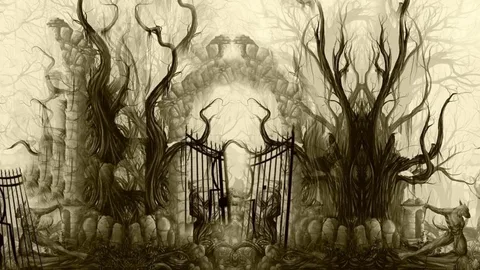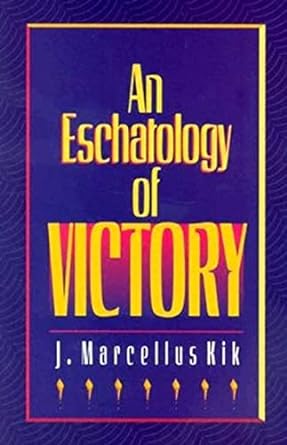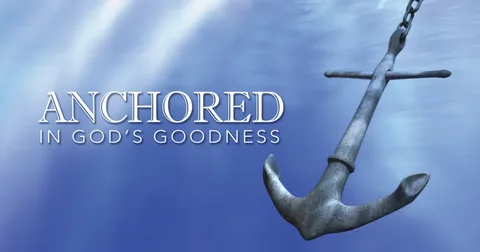
What Does “the gates of hell” Mean?
All my Christian life, now north of 45 years, I misunderstood the phrase “gates of hell.” What comes into your mind when you read Jesus’ resounding declaration:
And I tell you that you are Peter, and on this rock I will build my church, and the gates of Hades (hell) will not prevail against it.
You’ll remember the scene from Matthew 16. Jesus asks the disciples, “Who do people say the Son of Man is?” After they tell him what others think, he asks the most important question in the history of the world: “But what about you? Who do you say I am?” And Peter gives the right answer: “You are the Messiah, the Son of the living God.” Jesus replies that it is not flesh and blood that has revealed this to him, but his Father in heaven, and declares to them (and us) this immortal phrase about the gates of hell.
Catholics and Protestants disagree on what Jesus intended when he used the word rock, and specifically what this rock is. For Catholics the answer is who, Peter himself. They argue that when Jesus changed his name from Simon to Cephas, which in Aramaic means rock (the Greek translation being Peter), so the rock is Peter. We Protestants, by contrast, do not believe Christ’s church (his called out ones in Greek) would ever be built on a sinful human being. Rather, believing God’s word inscripturated in our Bibles as our ultimate authority, Sola Scripture in the Reformation phrase, we take Jesus to mean the rock is Peter’s declaration itself, that Jesus is “the Messiah, the Son of the living God.”
On the gates of hell, however, almost all Christians of whatever theological persuasion agree. Down here in this fallen world, Satan is on the offensive, and we Christians and the church are on the defensive. I know I always believed this without ever giving it a second thought. Of course Satan is on the offense and we’re on defense. I mean look around you. Isn’t it obvious? Satan clearly has the upper hand in this spiritual war on earth. Well, that depends on what our eyes see. But before I get there, last year I read a book about postmillennialism, and the author pointed out something that seems so obvious to me now that it shocks me I never thought about it, or ever heard anyone else in over four decades as a Christian mention it. And what is that?
In the ancient world gates were defensive mechanisms.
It’s that simple. Because the divine Son of God came to redeem the world from sin, and accomplished it, Satan is the one now on the defensive. As we’ll see, he is bound. We no longer have to assume he has the upper hand and he is winning. Christ won, and He is now exercising that victory through his body, the church. The problem is, it doesn’t seem we are victorious, sometimes in our personal lives, but most definitely not on a societal level. Our misunderstanding is primarily a theological one.
Christology, The Key to Understanding Eschatology
I consistently make the following point, and it will determine whether you can ever embrace postmillennialism, an eschatology of victory and hope. I’ll put it in the form of a question: Why did Jesus come to earth? I used to believe, like most Christians, that Jesus came to save my soul so that when I die I go to heaven. That was his primary mission, along with my personal holiness. We also believe because of Scripture that God so loved the world that he came to save it, but any real and substantive change in this fallen world of sin would have to wait until Jesus returns and completes redemption in a new heavens and earth. This will happen at the resurrection of the dead and the end of time as we know it. I believed our hope is primarily in the future, and not for the here and now. Sin is a force that can be incrementally defeated in our personal lives, and even somewhat further out, but on a societal level we are powerless to defeat it.
When I was younger and naïve, I thought it could “change the world.” In fact, it was not too many years ago, in 2010 to be exact, the year of my 50th birthday when I was obviously still naïve, that I read a book by sociologist James Davison Hunter called, To Change the World. I got something I wasn’t expecting, frustration; I should have taken seriously his subtitle. The dude clearly didn’t believe we could change the world. How dare he! Now I understand why, which I’ll get to shortly. Over time as I saw the world clearly not changing, or so I thought, I realized thinking I could change the world was ridiculous, a fool’s errand. I could and did, as all Christians do, push back against “the dark force,” but it was clear to me we are powerless to change the basic direction of the sinful fallenness all around us.
What Hunter, and I at the time, didn’t have was the theological categories to believe we could in fact change the world. Which brings me back to the question of why Jesus came to earth, and the topic of Christology, or the doctrine of the person of Christ, his being and mission. Did he come so we could go to heaven when we die, and work on personal holiness while putting up with the tragedy of this fallen world? I would suggest it’s far more than this, and much grander in its implications. It isn’t for nothing that God’s promises to Abraham and the Patriarchs are to the nations and not just individuals. When we learn from Scripture that Christ came to save the world, that says something about who he is as Savior and Redeemer. He came, as we’re told, to reconcile to himself all things, not just some things. Paul tells us this in Colossians 1:
15 The Son is the image of the invisible God, the firstborn over all creation. 16 For in him all things were created: things in heaven and on earth, visible and invisible, whether thrones or powers or rulers or authorities; all things have been created through him and for him. 17 He is before all things, and in him all things hold together. 18 And he is the head of the body, the church; he is the beginning and the firstborn from among the dead, so that in everything he might have the supremacy. 19 For God was pleased to have all his fullness dwell in him, 20 and through him to reconcile to himself all things, whether things on earth or things in heaven, by making peace through his blood, shed on the cross.
All of this is mediated through individuals, then families, then communities, then nations. This reconciliation touches all things human beings do, and while the ultimate fulfillment will happen at his second advent, it started at his first. He specifically said he came to bring the kingdom of God or heaven to earth. As he was fully God and fully man, he had absolute authority over his creation. He indicated this during his earthly ministry in his power over his creation in healing and nature, but fully brought its reality through his resurrection and ascension to the right hand of God to the position of ultimate authority in the universe. It is in these last days that he is exercising this authority through his people, his church, his body. We see how this is done in a parable of how this spiritual power is lived out among Christians every day.
The Binding the Strong Man
Jesus and the Pharisees had a problematic relationship. Jesus always seemed to be picking fights with them because their conceptions of Judaism were diametrically opposed to his. This wouldn’t become fully apparent until Jesus rose from the dead, and his followers learned the entire Old Testament and history of Israel were about him, their Messiah as God himself come in human flesh to save them from their sins. As I argue in Uninvented, first century Jews do not make up a Messiah like Jesus because he was completely unexpected. As I call him in the book, the conundrum that was Jesus. Nobody expected a divine, healing Messiah. In fact, one of the few Old Testament prophets who did miracles, Elijah, was supposed to introduce the Messiah (Malachi 4) who would conquer their enemies, specifically the Romans. But all Jesus seemed to do was heal people and preach, then get himself killed.
Which brings us to the parable of the binding of the strong man. I didn’t realize the episode in which Jesus tells it had far more to do with his kingdom rule than just casting out demons during his ministry. The kingdom of God or heaven is a debated topic in eschatology. When John was introducing Jesus’ ministry to the Jews, he declared:
Repent, for the kingdom of heaven has come near! (Matt. 3)
Matthew then quotes Isaiah saying John was one crying out in the wilderness to make way for the Lord. Nobody could conceive the Messiah being Yahweh himself, Israel’s God. In other words, the bringing of the Kingdom wouldn’t be just a messenger for Yahweh, as everyone thought, but the eternal Creator God Himself personally bringing his kingdom reign and influence into the fallen earth. John was saying, literally, everything was about to change. Jesus in Matthew 4 after having endured the temptations in the desert of the then current king, Satan, echoed the Baptist:
17 From then on Jesus began to preach, “Repent, for the kingdom of heaven has come near!”
Both say, “come near,” because the kingdom won’t arrive until Jesus completes his mission and is seated at the right hand of God after his ascension. He isn’t until he sends his Holy Spirit at Pentecost that the King through his church, his body, will reign and destroy the works of the devil. When Christ completed his mission, Satan was no longer king of this world; he lost his authority to call the shots over the nations. Remember, prior to the gospel there was only one tiny obscure nation in the world that worshiped the true God, and even they were slaves to Roman power. After Christ the nations as nations could now be discipled.
The reason this could happen is that Satan was bound and his power limited by the authority Christ had been given because of the success of his mission. We read of this binding in the Synoptic gospels. In Matthew 12, Jesus had been casting out demons, and the Pharisees said it was because of Beelzebul, the prince of demons, that he was able to do this. He basically says it would be absurd for Satan to drive out Satan because a kingdom divided against itself cannot stand. Then he tells them:
28 But if it is by the Spirit of God that I drive out demons, then the kingdom of God has come upon you.
And then addresses the strong man:
29 Or how can someone enter a strong man’s house and plunder his goods, unless he first binds the strong man? Then indeed he may plunder his house.
Satan is the strong man, and he has now been bound because the kingdom of God has come. Since the resurrection, ascension, and Pentecost, we are in the plundering phase of history. John tells us as much in Revelation 20 when he says:
2 He seized the dragon, that ancient serpent, who is the devil, or Satan, and bound him for a thousand years.
Those who are amillennial and postmillennial believe the thousand years is not a literal number of years, as premillennialists do, but the period of time known as the last days, the period between Jesus’ first and second coming. It is the time, as Jesus taught us to pray that the kingdom of God would come and His will would be done on earth as it is in heaven.
Do We Live by Faith or by Sight?
For most of my Christian life when it came to how I interpreted life in this fallen world, I lived by sight. It sure seemed like Satan wasn’t bound at all. Yet Scripture told me he was. So I had to decide, was I going to believe God or my lyin’ eyes. Going back to the gates of hell, if I believe God, then Satan’s kingdom is the kingdom on the defensive. Prior to embracing postmillennialism that was impossible for me to believe. In fact, it never even occurred to me! What’s so exciting about my new optimistic eschatology is that it is rooted in reality. We’re in a war! A spiritual war to be exact, as Paul tells us in Ephesians 6:12. But the context of the war is Ephesians 1:18-23, and Christ having all authority over every power that exists in the spiritual and material realms, in this life as well as the life to come.
As in any war, people have different roles, privates, sergeants, Lieutenants, generals; there is also army, navy, Airforce, marines; there are victories, there are defeats. As in any war there are strategies and tactics. But one thing is certain: the superior force is primarily on the offensive, and the weaker on the defensive. Over time it becomes apparent which is which. Sometimes the grunts just have to trust the generals even when it looks really bad. The superior force will always win in the end, and we as followers of the King of the universe are the superior force! We win, and not just in the end, at Christ’s second coming, but here, now. We are part of the King’s army establishing his rule on earth, daily assaulting the gates of hell with the fruit of the Spirit against which the gates of hell don’t have a chance.





Recent Comments